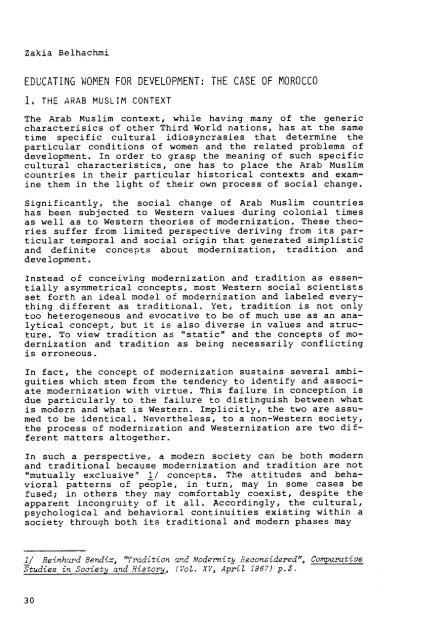Ifda dossier 47, May/June 1985
Ifda dossier 47, May/June 1985
Ifda dossier 47, May/June 1985
Create successful ePaper yourself
Turn your PDF publications into a flip-book with our unique Google optimized e-Paper software.
Zakia Belhachmi<br />
EDUCATING WOMEN FOR DEVELOPMENT: THE CASE OF MOROCCO<br />
1, THE ARAB MUSLIM CONTEXT<br />
The Arab Muslim context, while having many of the generic<br />
characterisics of other Third World nations, has at the same<br />
time specific cultural idiosyncrasies that determine the<br />
particular conditions of women and the related problems of<br />
development. In order to grasp the meaning of such specific<br />
cultural characteristics, one has to place the Arab Muslim<br />
countries in their particular historical contexts and exam-<br />
ine them in the light of their own process of social change.<br />
Significantly, the social change of Arab Muslim countries<br />
has been subjected to Western values during colonial times<br />
as well as to Western theories of modernization. These theo-<br />
ries suffer from limited perspective deriving from its par-<br />
ticular temporal and social origin that generated simplistic<br />
and definite concepts about modernization, tradition and<br />
development.<br />
Instead of conceiving modernization and tradition as essen-<br />
tially asymmetrical concepts, most Western social scientists<br />
set forth an ideal model of modernization and labeled every-<br />
thing different as traditional. Yet, tradition is not only<br />
too heterogeneous and evocative to be of much use as an ana-<br />
lytical concept, but it is also diverse in values and struc-<br />
ture. To view tradition as "static" and the concepts of mo-<br />
dernization and tradition as being necessarily conflicting<br />
is erroneous.<br />
In fact, the concept of modernization sustains several ambi-<br />
guities which stem from the tendency to identify and associ-<br />
ate modernization with virtue. This failure in conception is<br />
due particularly to the failure to distinguish between what<br />
is modern and what is Western. Implicitly, the two are assu-<br />
med to be identical. Nevertheless, to a non-Western society,<br />
the process of modernization and Westernization are two dif-<br />
ferent matters altogether.<br />
In such a perspective, a modern society can be both modern<br />
and traditional because modernization and tradition are not<br />
"mutually exclusive" I/ concepts. The attitudes and beha-<br />
vioral patterns of people, in turn, may in some cases be<br />
fused; in others they may comfortably coexist, despite the<br />
apparent incongruity of it all. Accordingly, the cultural,<br />
psychological and behavioral continuities existing within a<br />
society through both its traditional and modern phases may<br />
- l/ Reinhard Bendiz, "Tradition and Modernity Reconsidered", Comparative<br />
Studies in Society and History, (Vol. XV, April 1967) p. 3.<br />
3 0
















